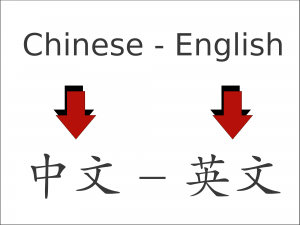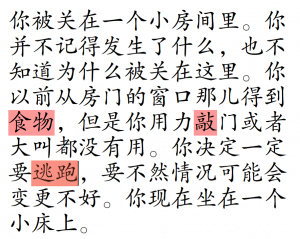
In this modern and enlightened age of communicative language teaching and comprehensible input, translation is not often advocated as the key to learning foreign languages.
And rightly so.
However, that doesn’t mean that translation is useless, or that moderate amounts of it can’t be beneficial.
When I talk about translation as a learning method, I’m including both translation from Chinese to your native language, and from your native language to Chinese. These are obviously completely different activities that can be beneficial in different ways, but more about that later; I just want to make it clear that both are part of this month’s learning challenge.
Tune in to the Hacking Chinese Podcast to listen to the related episode:
Available on Apple Podcasts, Google Podcast, Overcast, Spotify, YouTube and many other platforms!
If you’re interested in translation as a profession rather than as a way of learning Chinese, this challenge is for you as well. You should also read this article about how to become a translator:
How to become a Chinese-English translator and what it’s like to be one
Hacking Chinese translation challenge, August 10-31, 2023
Hacking Chinese Challenges are about building language skills through daily practice and friendly competition. By focusing on one specific area of learning over a limited period of time, you will be able to learn more!
Tune in to the Hacking Chinese Podcast to learn more about Hacking Chinese Challenges:
Available on Apple Podcasts, Google Podcast, Overcast, Spotify and many other platforms!
This how you sign up and join the challenge:
- Sign up or sign in (using your e-mail, Facebook or Twitter)
- View current and upcoming challenges on the front page
- Find the current challenge and click “Enroll!”
- Set a reasonable goal (10-40 minutes per day depending on your situation)
- Make basic plan (including which direction to translate, if not both)
- Report progress on your computer or mobile device
- Check the graph to see if you’re on track to reaching your goal
- Check the leader board to see how you compare to others
- Share progress, tips and resources with fellow students
Please note: The challenge starts on the 10th, so even if you can join right now, you won’t be able to report progress until then.
The case for translating from your native language to Chinese
In a sense, this is what most students do inadvertently when they start learning. You begin with an idea phrased in your native language, and you want to figure out how to say or write that in Chinese. If you are at this stage of learning, I recommend this guide to help you avoid translating directly from your native language:
Actually, that guide is relevant for non-beginners too!
The main benefit of translating to Chinese, compared with writing in Chinese directly, is that it tends to broaden your horizons by forcing you down linguistic routes you haven’t travelled before. When writing for pleasure, most of us will write similar texts. When writing with a specific purpose in mind, such as for work, the topics and settings tend to be similar as well.
Translation allows you to practise expressing things in Chinese you wouldn’t otherwise come across very often. When you write your own texts, it’s easy to steer away from things you find difficult to express. I’m convinced this happens on a subconscious level, at least partially.
For more about translating from your native language to Chinese, please refer to: Improving your Chinese by translating from another language
The case for translating to your native language from Chinese
This is closer to the traditional grammar-translation method for teaching languages, which used to hold sway in foreign language teaching before practical communicating in the target language became the goal.
However, just because most people today agree that relying on translation is not a good method if your goal is to learn to speak fluently, that doesn’t mean that the method should never be used. We shouldn’t throw the baby out with the bathwater.
 Translation from Chinese is in essence a highly active form of reading. Normally, we’re happy with a superficial understanding of the texts we read; most teachers, including myself, recommend students to not look everything up and to be okay with a high but not perfect degree of understanding. Extensive reading is good for you.
Translation from Chinese is in essence a highly active form of reading. Normally, we’re happy with a superficial understanding of the texts we read; most teachers, including myself, recommend students to not look everything up and to be okay with a high but not perfect degree of understanding. Extensive reading is good for you.
Translation challenges that and forces you to really understand what you’re reading to be able to translate it. This usually involves reading the same sentence many times, which is something rarely done normally if we think we kind of understood the first time.
In a way, translation is a way to stop you from hiding behind words vaguely understood. Sometimes when you speak and write Chinese, you can get away with a non-perfect understanding of what something means; you just need to know that it can be used in that way. In other words, you can say things that are correct because you’ve heard someone say it, but it might not actually mean exactly what you think it means.
Therefore, I find lessons that focus on translation to the students’ native language interesting because it allows us to discuss what things really mean. This can indeed be done in Chinese too, but the level required to do so accurately is many times higher than that required to just understand the text in the first place. Even if the discussion itself is in Chinese, translation can still be interesting when you dig deeper into the differences and similarities between languages.
Discussing various ways of translating Chinese to other languages is always most interesting when done in a group, preferably one consisting of native speakers of both languages. I realise that this is not easy for most participants in the challenge to find, but teaming up with one Chinese-speaking friend is enough. You will both learn a lot from this experience!
You can read more about translating from Chinese here: How translation to another language can help you learn Chinese
How translation to another language can help you learn Chinese
Your challenge
What will you translate? And will you translate from Chinese to your native language or the other way around? Leave a comment and let us know what your goal is!
Preliminary challenge schedule for 2023
Here is a preliminary list of challenges for 2023, but I’m always open for ideas. Based on user participation, surveys as well as my own opinion, reading and listening challenges are particularly helpful for a large number of people, followed by those focusing on vocabulary. These will recur more often throughout the year, with other, more specific challenges spread out in-between.
Challenges last for roughly three weeks. They always start on the 10th each month and last until the end of that month. Three weeks is enough to get a significant amount of studying done, but not so long that people lose focus. This also leaves ten days of breathing space between challenges.
- January: Listening
- February: Writing
- March: Reading
- April: Speaking
- May: Listening
- June: Vocabulary
- July: Reading
- August: Translation
- September: Listening
- October: Pronunciation
- November: Reading
- December: Vocabulary

Tips and tricks for how to learn Chinese directly in your inbox
I've been learning and teaching Chinese for more than a decade. My goal is to help you find a way of learning that works for you. Sign up to my newsletter for a 7-day crash course in how to learn, as well as weekly ideas for how to improve your learning!
